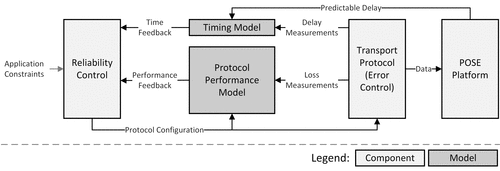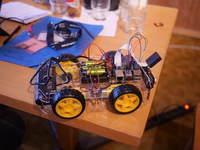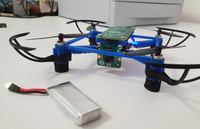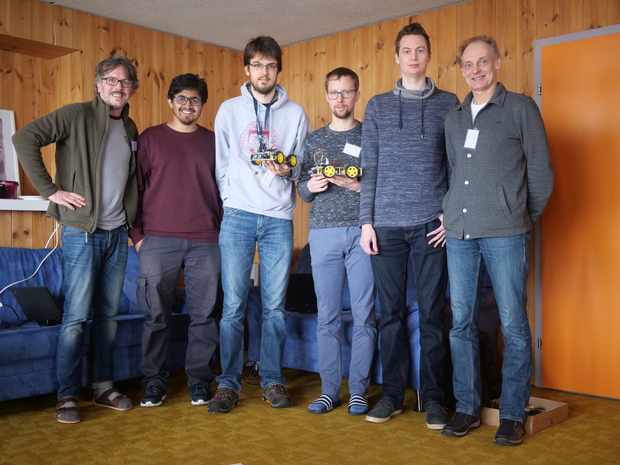
This project is part of the DFG (Deutsche Forschungsgemeinschaft) priority programme SPP 1914 “Cyber-Physical Networking”. It started as LARN in October 2016 and after successful application for the second funding phase of the SPP, this continuation project started in January 2020 (DFG project number 315036956). It is carried out in cooperation with Department of Computer Science 4 at Friedrich-Alexander-Universität Erlangen-Nürnberg.
Vision#
We propose to develop transport channels for distributed cyber-physical systems. Such channels need to be energy-, latency-, and resilience-aware; i.e. the latency as seen by the application must be predictable and in certain limits, e.g. by balancing latency and resilience, be guaranteed. At the same time, the energy aspects must be considered, as CPS devices often have limited access to power sources. Achieving these awareness-properties is only possible by an innovative transport protocol stack and an appropriate fundament of operating system and low level networking support. Thereto the project unites the disciplines Operating Systems / Real-Time Processing and Telecommunications / Information-Theory.

Project target is the evolution of the PRRT (predictably reliable real-time transport) transport protocol stack towards a highly efficient multi-hop-protocol with transparent transmission segmentation. This is enabled by an interdisciplinary co-development with a latency-aware operating system kernel incl. wait-free synchronisation and the corresponding low level networking components. The statistical properties of the entire system (RNA, “reliable networking atom”) shall be optimised and documented.
A software-defined networking testbed for validation of the system in a real-world wide area network scenario is available. The developed components are introduced during the workshops organised by the priority programme SPP1914 “Cyber-physical Networking” and is made available to other projects during the entire run-time of the priority programme.
Objectives#
First phase:
- Develop a latency- and resilience-aware atomic unit for cyber-physical networks.
- Optimise the cross-layer communication while maintaining separability.
- Validate the approach in theory and experiments.
- Document the statistics of the predictable quality of communication (QoC).
Second phase:
- Develop a latency-, resilience- and energy-aware atomic unit for cyber-physical networks.
- Optimise communication across all layers (vertical) and between hosts (horizontal).
- Extract, refine and validate models for latency, resilience and energy aspects of cyberphysical networks.
- Document the statistics of the predictable quality of communication (QoC) in selected CPN applications.
Solutions & Results#
- Reliable Networking Atom (RNA) (Poster SPP Colloquium 2017)

- Node (Odroid XU4 based, general purpose CPN node with extended graphic processing)
- Car (Raspberry Pi based, mobile platform)
- Drone (CrazyFlie based, highly mobile and energy-constrained platform)
- Predictably Reliable Real-time Transport (PRRT) Protocol

- Partially reliable, time-constrained process-to-process communication
- Adaptive Hybrid Error Control
- Latency-avoiding Congestion Control
- Rate Control & Pacing
- X-Lap: Cross-Layer Profiling and Latency AnalysisTool (Presentation - RTN2017)
- Transparent Transmission Segmentation (TTS) (Presentation - NetSoft2017)
Activities#
- Co-Organization of the IEEE Workshop on Cyber-Physical Networks (2019, 2020).
- Contributions to the “Network Support for Gain Scheduled Control” BarCamp started in November 2018 in Aachen.
- Organization of the “Hands-On Cyber-Physical Networking” BarCamp within the SPP1914 Winter School in Arosa.
Presentations#
- Colloquium, 15th November 2022
- 4th Plenary Meeting, 30th November 2018, Tübingen
- KuVS Summer School “Industrial Internet”, 15th August 2018, Dinklage
- BarCamp “Hands-On Cyber-Physical Networking”
- 3rd Plenary Meeting, 23rd April 2018, Berlin
- 2nd Plenary Meeting, 19th October 2017, Aachen
- 1st Plenary Meeting, 21th October 2016, Munich
- International Symposium on Networked Cyber-Physical Systems (NetCPS, Poster Session), 20th September 2016, Munich
“Approaches for Resilience- and Latency-Aware Networking”
Andreas Schmidt, Thorsten Herfet
Publications#
The publications can also be found on Google Scholar.
2024 #
2023 #
Delay- and Reliability-Aware Secure Transport
Moritz MiodekBachelor's Thesis2022 #
Resource-demand Estimation for Edge Tensor Processing Units
Benedict Herzog, Stefan Reif, Judith Hemp, Timo Hönig, Wolfgang Schröder-Preikschat2021 #
AnyCall: Fast and flexible system-call aggregation
Luis Gerhorst, Benedict Herzog, Stefan Reif, Wolfgang Schröder-Preikschat, Timo HönigLow-Level Design of Energie-Efficient HARQ at the Transport Layer
Mikolai-Alexander GütschowBachelor's ThesisTowards automated system-level energy-efficiency optimisation using machine learning
Benedict Herzog, Stefan Reif, Fabian Hügel, Timo Hönig, Wolfgang Schröder-PreikschatAutomated Selection of Energy-efficient Operating System Configurations
Benedict Herzog, Fabian Hügel, Stefan Reif, Timo Hönig, Wolfgang Schröder-PreikschatAnnotate once — analyze anywhere: Context-aware WCET analysis by user-defined abstractions
Simon Schuster, Peter Wägemann, Peter Ulbrich, Wolfgang Schröder-PreikschatAI Waste Prevention: Time and Power Estimation for Edge Tensor Processing Units: Poster
Stefan Reif, Benedict Herzog, Judith Hemp, Wolfgang Schröder-Preikschat, Timo HönigTransparent Transmission Segmentation under Delay and Reliability Constraints
Sven LiefgenMaster's ThesisThe price of meltdown and spectre: Energy overhead of mitigations at operating system level
Benedict Herzog, Stefan Reif, Julian Preis, Wolfgang Schröder-Preikschat, Timo HönigUtilizing Performance Counter Information To Improve the Linux Governor Decisions
Anatoliy CherepantsevBachelor's ThesisMulticast Binary Forward Error Coding at the Transport Layer
Kai VogelgesangResearch Immersion LabFlexible and Low-Overhead System-Call Aggregation using BPF
Luis GerhorstMaster's ThesisEnergy Implications of Spectre and Meltdown Mitigations
Julian PreisBachelor's Thesis2020 #
Deep Adaptive Hybrid Error Coding
Ashkan Taslimi BaboliMaster's ThesisNearly symmetric multi-core processors
Stefan Reif, Benedict Herzog, Fabian Hügel, Timo Hönig, Wolfgang Schröder-PreikschatX-Leep: Leveraging cross-layer pacing for energy-efficient edge systems
Stefan Reif, Benedict Herzog, Pablo Gil Pereira, Andreas Schmidt, Tobias Büttner, Timo Hönig, Wolfgang Schröder-Preikschat, Thorsten HerfetPrecious: Resource-Demand Estimation for Embedded Neural Network Accelerators
Stefan Reif, Wolfgang Schröder-PreikschatPrecious: Resource-Demand Estimation for Embedded Neural Network Accelerators
Stefan Reif, Benedict Herzog, Judith Hemp, Timo Hönig, Wolfgang Schröder-PreikschatVisualization Tool for Control in Networked Cyber-Physical Systems
Sebastian MorgensternBachelor's ThesisLow-power Real-time Communication in Linux-based Embedded Systems
Tobias BüttnerBachelor's Thesis2019 #
Earl: energy-aware reconfigurable locks
Stefan Reif, Phillip Raffeck, Heiko Janker, Luis Gerhorst, Timo Hönig, Wolfgang Schröder-PreikschatCross-layer pacing for predictably low latency
Andreas Schmidt, Stefan Reif, Pablo Gil Pereira, Timo Hönig, Thorsten Herfet, Wolfgang Schröder-PreikschatEnergy-demand estimation of embedded devices using deep artificial neural networks
Timo Hönig, Benedict Herzog, Wolfgang Schröder-PreikschatTowards Low-Jitter and Energy-Efficient Data Processing in Cyber-Physical Information Systems
Stefan Reif, Luis Gerhorst, Kilian Bender, Timo HönigEnabling wireless network support for gain scheduled control
Sebastian Gallenmüller, René Glebke, Stephan Günther, Eric Hauser, Maurice Leclaire, Stefan Reif, Jan Rüth, Andreas Schmidt, Georg Carle, Thorsten Herfet2018 #
A predictable synchronisation algorithm
Stefan Reif, Wolfgang Schröder-Preikschat2017 #
Network Protocol for Video Transport in Cyber-Physical Systems
Lukas BardMaster's ThesisIn the Heat of Conflict: On the Synchronisation of Critical Sections
Stefan Reif, Timo Hönig, Wolfgang Schröder-PreikschatTransparent Transmission Segmentation for Multimedia Applications
Daniel BirtelMaster's Thesis2016 #
Latency-Aware aedia delivery through software-defined networks
Thorsten Herfet, José Manuel Menéndez García
People and Partners#

Telecommunications Lab#

- Prof. Dr.-Ing. Thorsten Herfet
- Pablo Gil Pereira, MSc.
- Dr.-Ing. Andreas Schmidt
- Dr.-Ing. Yongtao Shuai
- Ashkan Taslimi, BSc.
- Marlene Böhmer, BSc.
- Sven Liefgen, BSc.
- Kai Vogelgesang, BSc.
- Philipp Tennigkeit, BSc.
- Daniel Birtel, MSc.
- Lukas Bard, MSc.
Chair for Distributed Systems and Operating Systems#

- Prof. Dr.-Ing. Wolfgang Schröder-Preikschat
- Stefan Reif, MSc.
- Dr.-Ing. Timo Hönig
- Dr.-Ing. Peter Ulbrich
1st IEEE Workshop on Cyber-Physical Networks Co-Organizers#

- Dr.-Ing. Timo Hönig (Friedrich-Alexander-University Erlangen-Nürnberg)
- Prof. Dr.-Ing. Klaus Wehrle (RWTH Aachen University)
- Dr. sc. Sebastian Trimpe (Max Planck Institute for Intelligent Systems)
BarCamp Aachen Contributors (EdgeSys2019 Paper)#
- Sebastian Gallenmüller, MSc. (Technical University of Munich)
- René Glebke, MSc. (RWTH Aachen University)
- Dr.-Ing. Stephan Günther (Technical University of Munich)
- Eric Hauser, BSc. (Technical University of Munich)
- Maurice Leclaire, MSc. (Technical University of Munich)
- Jan Rüth, MSc. (RWTH Aachen University)
BarCamp “Hands-On Cyber-Physical Networking” Contributors#
- Adwait Datar, MSc. (TUHH)
- Christine Kloock, MSc. (TUHH)
- Florian Rosenthal, MSc. (KIT)